Sudan
The Sudanese army and the Rapid Support Forces, which have been fighting for control of the country for four days, agreed on a 24-hour ceasefire on Tuesday, according to Arab media.
Hope for a pause in the violence emerged as escalating fighting threatened to drag the country into a spiral of chaos. Millions of Sudanese, in the capital and other major cities, took refuge in their homes, caught in the crossfire as the two forces bombarded residential areas with artillery fire and airstrikes and engaged in firefights in the street.
Over the past day, fighters from Khartoum have attacked a US Embassy convoy and stormed the home of the European Union envoy to Sudan, but neither attack has made of victims. The convoy of clearly marked vehicles from the US embassy was attacked on Monday, and preliminary reports link the attackers to the Rapid Support Forces, the paramilitary group fighting against the Sudanese army, the source told the press US Secretary of State Antony Blinken. All members of the convoy are safe and sound, he added.
Al Arabiya and Al Jazeera satellite channels quoted Lieutenant General Shams El Din Kabbashi , a senior military command official, as saying the army would respect the ceasefire. CNN Arabic quoted army chief General Abdel Fattah Burhan as saying the army would be part of the one-day truce. Earlier in the day, the army's adversary, the Rapid Support Forces, said it would observe a 24-hour humanitarian truce.
Military officials, however, did not publicly announce an immediate ceasefire . In the afternoon, clashes were again reported around the army headquarters and near the nearby airport, two important combat areas since fighting broke out on Saturday. Fighting also took place around a strategic air base at Merowe, some 350 kilometers northwest of Khartoum.
More than 185 people have been killed and more than 1,800 injured since fighting began on Saturday, according to UN figures, which do not show the breakdown of civilians and combatants. The Sudan Doctors Syndicate said on Tuesday that at least 144 civilians had been killed and more than 1,400 injured.
The total death toll could be much higher as clashes in Khartoum prevented the removal of bodies in some areas.
The violence raised the specter of civil war just as Sudanese tried to revive the idea of a democratic civilian government after decades of military rule. Faced with growing concern, Mr. Blinken intensified his efforts for a ceasefire.
He spoke by telephone at the end of the day on Monday with the two rival generals - the head of the armed forces, General Burhane , and the head of the RSF, General Mohammed Hamdan Daglo - in order to obtain a halt to the fighting for 24 hours, which would serve as the basis for a longer truce and the resumption of negotiations.
Mr. Daglo said in a series of tweets on Tuesday that he had approved a 24-hour humanitarian truce after speaking with Mr. Blinken.
The army's initial response seemed to reject any truce. She said in a statement that she was "unaware of any coordination with the mediators" on a truce and that additional troops would join the battle. The fighting has entered a decisive phase and the coming hours will see a crushing defeat for the security forces.
Other tanks and armored vehicles belonging to the army entered Khartoum early on Tuesday, heading for the army headquarters and the Republican Palace, the seat of power, according to residents. During the night, fighter jets flew over the city and anti-aircraft fire lit up the sky.
Fighting resumed early Tuesday around the main bases of both sides and strategic government buildings, all located in residential areas. Video from Arab TV channel Al Arabiya showed a loud explosion near the main military headquarters in central Khartoum, which raised a huge cloud of smoke and dust.
Satellite images taken Monday by Maxar Technologies showed the damage suffered by Khartoum, in particular to the buildings of the security services. Tanks stood guard at a bridge spanning the White Nile and other places in the Sudanese capital.




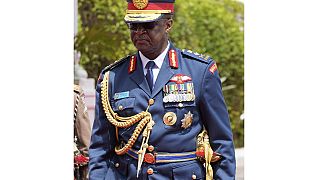
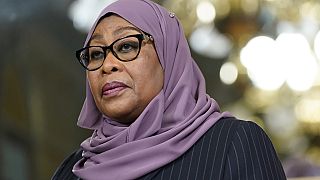
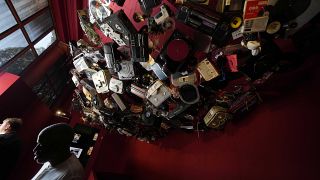
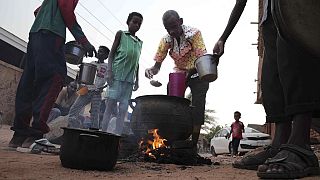
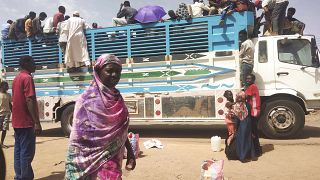
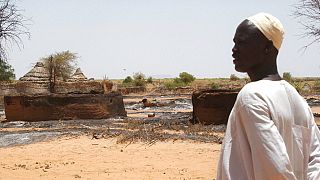
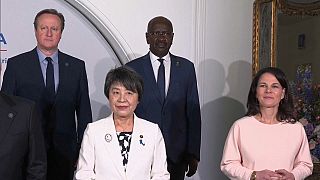
01:57
South Sudanese parties adopt code of conduct ahead of December elections
01:07
Mali's junta bans media from reporting on political activities
00:51
Mali bans political party activities as calls for elections grow
Go to video
HRW accuses Wagner of killing civilians with Malian army
01:26
Gaza war: UN Security Council passes first resolution calling for a ceasefire
00:52
Sudan's military rejects Ramadan ceasefire